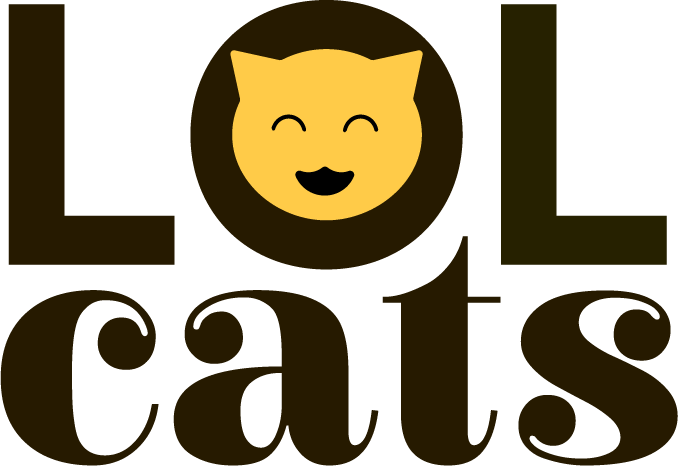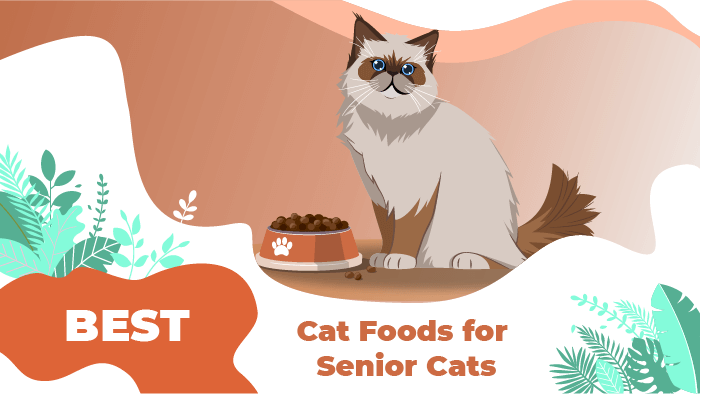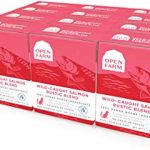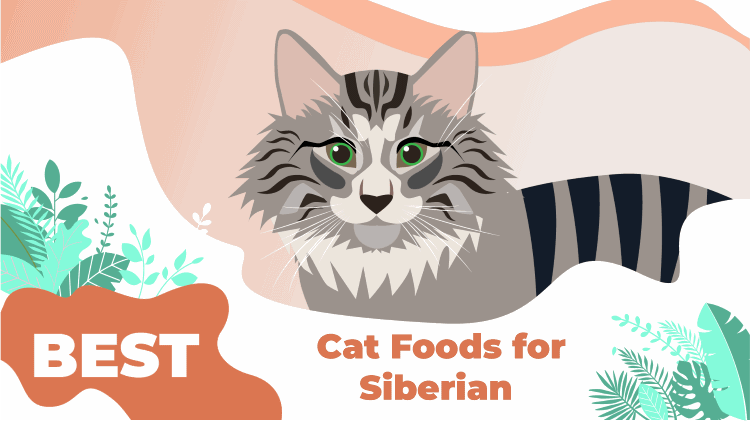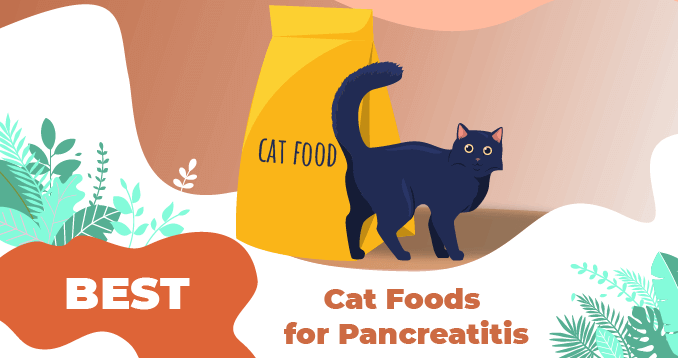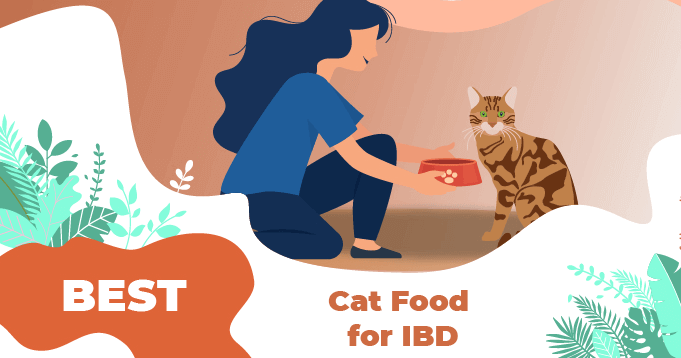The 5 Best Cat Foods For Senior Cats
This page contains affiliate links. We may earn money or products from the companies mentioned in this post through our independently chosen links, which earn us a commission.
They say that cats have nine lives but, unfortunately, those lives aren’t endless.
As your cat starts to get older, you may notice some changes in its behavior and in its body.
Your cat might not be as active as it once was, and it might not eat as much as it used to. To keep your senior cat as healthy as possible for as long as possible, take the time to choose the best cat food for senior cats.
Continue reading to learn more about your senior cat’s nutritional requirements and to receive some simple tips for picking the best cat food to meet those needs. You’ll also receive our top 5 picks for the best cat food for senior cats.
Compare Best Cat Foods For Senior Cats
|
Overall Best
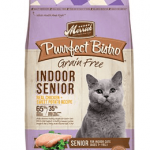
1. Merrick Purrfect Bistro Grain-Free Indoor Senior Recipe Dry Cat Food |
Best Affordable
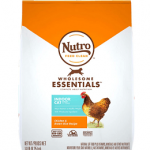
2. NUTRO WHOLESOME ESSENTIALS Adult Indoor Natural Dry Cat Food |
Best Wet Cat Food
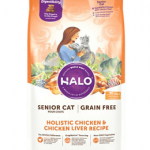
4. Halo Holistic Chicken & Chicken Liver Recipe Grain-Free Senior Dry Cat Food |
Best Senior Cat Food for Allergies
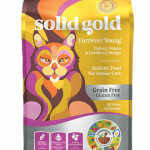
5. Solid Gold Furrever Young Grain-Free Senior Cat Food |
|
|
Protein
38.5% Min |
Protein
36% Min |
Protein
8% Min |
Protein
9% Min |
Protein
33% Min |
|
Fat
12% Min |
Fat
17% Min |
Fat
4% Min |
Fat
7% Min |
Fat
12% Min |
|
Fiber
7.5% Max |
Fiber
6% Max |
Fiber
2% Max |
Fiber
2.5% Max |
Fiber
4.5% Max |
|
Moisture
11% Max |
Moisture
10% Max |
Moisture
82% Max |
Moisture
78% Max |
Moisture
10% Max |
|
Caloric Content
353 kcal/cup |
Caloric Content
385 kcal/cup |
Caloric Content
805 kcal/kg or 135 kcal/156 g carton |
Caloric Content
99 kcal/can |
Caloric Content
360 kcal/cup |
|
Food Type
|
Food Type
|
Food Type
Fresh |
Food Type
|
Food Type
|
Special Dietary Needs Of Senior Cats
As your cat gets older, its metabolism may slow down, and it may not be as active as it once was.
It still needs a balanced diet for optimal health, but you’ll want to control its caloric intake to prevent it from gaining an unhealthy amount of weight.
The best cat food for senior cats will be rich in protein with healthy fats and nutritional supplements for balance.
Here are some things to look for in a cat food for senior cats:
- Quality Protein. Animal proteins are complete proteins which means that they contain all of the essential amino acids your cat needs. A diet rich in protein will help your cat maintain lean muscle mass as it gets older.
- Omega Fatty Acids. Healthy fats provide your cat with calories for energy as well as omega fatty acids for healthy skin and coat. This is particularly important as your cat gets older.
- Low Carb. Cats have no nutritional requirement for carbohydrates, though a small amount can provide dietary fiber and essential nutrients as long as it comes from a digestible source.
- Digestibility. In addition to a slower metabolism, many senior cats also develop sensitive digestive systems. Making sure that your cat’s food is highly digestible is the key to ensuring that its body is able to absorb and utilize nutrients efficiently.
Keeping all of these things in mind, you’re now ready to learn how to choose the best cat food for senior cats. Here’s what you need to know:
How To Choose The Best Cat Food For Senior Cats?
Cats are obligate carnivores which means that their bodies are evolved to digest and utilize nutrition most efficiently from animal rather than plant sources.
This means that protein is the most important nutrient in a cat’s diet and it should come from quality animal sources like meat, poultry, and fish. Your cat requires a minimum of 26% protein in its diet to maintain lean muscle mass.
In addition to plenty of protein, your cat’s diet should contain healthy fats, ideally from animal sources.
Fat provides a highly concentrated source of energy for your cat in addition to supporting its healthy skin and coat.
Your cat requires a minimum of 9% fat in its diet to meet its basic nutritional needs but avoid going too much higher because fat is high in calories and could put your senior cat at risk for obesity as it gets older.
In addition to protein and fat, your cat can benefit from other nutrients in its diet.
Vitamin and mineral supplements are recommended to ensure the proper ratio of nutrients.
Chelated minerals are the best mineral supplements to look for because they have been bound to protein molecules which makes them easier for your cat’s body to digest and absorb.
Other beneficial supplements to look for include prebiotic fibers and probiotics to support healthy and regular digestion.
Another concern with senior cats is the risk for dental health problems.
While wet cat food is higher in moisture and is usually richer in protein, it may contribute to dental issues rather than helping prevent them.
Dry cat food helps scrape plaque and tartar off your cat’s teeth, helping to keep them clean and healthy as it gets older.
To make sure your cat gets the moisture and healthy fats it needs, however, you may want to add a little wet food to supplement its diet.
Keep reading to see our top 5 recommendations for the best cat food for senior cats.
The Top 5 Best Rated Cat Foods For Older and Senior Cats Reviewed
Choosing a high-quality senior cat food is essential for maintaining your cat’s health and wellness into its old age. The best cat food for senior cats will be rich in animal protein with moderate fat and balanced with essential nutrients, all from digestible sources. Here are our top 5 picks for the best cat food for senior cats that you should consider:
Merrick Purrfect Bistro Grain-Free Indoor Senior Recipe Dry Cat Food
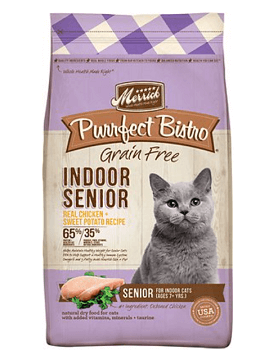
Product Info
- Protein: 38.5% Min
- Fat: 12% Min
- Fiber: 7.5% Max
- Moisture: 11% Max
- Caloric Content: 353 kcal/cup
- Made with 70% protein and fat ingredients
- Features real deboned chicken as a lean source of protein
- Plenty of beneficial supplements for balanced nutrition
- Contains some plant protein (potato protein)
NUTRO WHOLESOME ESSENTIALS Adult Indoor Natural Dry Cat Food
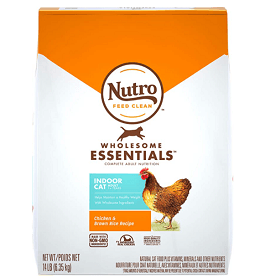
Product Info
- Protein: 36% Min
- Fat: 17% Min
- Fiber: 6% Max
- Moisture: 10% Max
- Caloric Content: 385 kcal/cup
- Features chicken meal as a concentrate source of lean protein
- Rich in omega fatty acids for healthy skin and coat
- Chelated minerals for optimal nutrient absorption
- Not a grain-free recipe, some cats may be sensitive
- Contains some plant protein (pea protein)
Open Farm Wild-Caught Salmon Rustic Blend
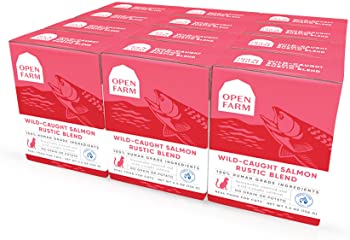
Product Info
- Protein: 8% Min
- Fat: 4% Min
- Fiber: 2% Max
- Moisture: 82% Max
- Caloric Content: 805 kcal/kg or 135 kcal/156 g carton
- Food Type: Fresh
- No fillers, animal by-products, or vaguely named ingredients
- Contains the moisture your cat needs for hydration
- Made from 100% human-grade, ethically sourced ingredients
- Fairly expensive compared to the average cat food
- Contains several plant-based ingredients
You simply fill out a profile with information about your cat’s age and size as well as any special dietary needs or preferences. From there, you’ll receive monthly shipments of fresh cat food delivered right to your door.
Halo Holistic Chicken & Chicken Liver Recipe Grain-Free Senior Dry Cat Food
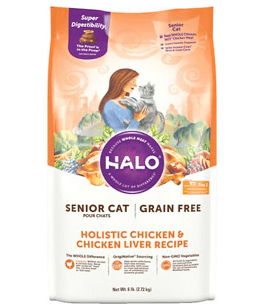
Product Info
- Protein: 9% Min
- Fat: 7% Min
- Fiber: 2.5% Max
- Moisture: 78% Max
- Caloric Content: 99 kcal/can
- Holistic recipe made from digestible high-quality ingredients
- Lean source of protein (real whole chicken)
- Supplemented with chelated minerals
- Some cats don’t like pate texture foods
Solid Gold Furrever Young Grain-Free Senior Cat Food
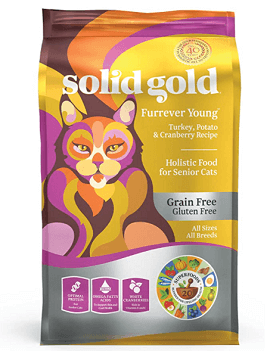
Product Info
- Protein: 33% Min
- Fat: 12% Min
- Fiber: 4.5% Max
- Moisture: 10% Max
- Caloric Content: 360 kcal/cup
- Features a lean source of animal protein (turkey)
- Grain-free and free from low-quality fillers and artificial additives
- Supplemented with superfoods for nutritional quality
- Some picky cats don’t like the flavor
- No supplements for joint health
How Much Should You Feed Your Senior Cat?
Overfeeding is always a concern for cats, but it is particularly dangerous for senior cats.
As your cat gets older and its metabolism slows down, it requires less food to meet its basic energy needs – if you overfeed your cat, it could become obese which puts it at risk for a variety of other health problems.
Generally speaking, cats require between 25 and 35 calories per pound of body weight per day.
The best way to determine how much to feed your cat is to choose a high-quality senior cat food and follow the feeding instructions according to its age and weight.
What About Food Allergies And Sensitivities?
Cats are just as prone to food allergies and sensitivities as humans, though they may present in different ways.
Food allergies common cause skin-related symptoms such as itchy skin, ear infections, and dry coat as well as respiratory symptoms like sneezing, coughing, or wheezing. Some of the most common allergens known to affect cats are beef, dairy products, grains, and artificial additives.
If you’re concerned that your cat has a food allergy, consider switching to a hypoallergenic cat food or a limited ingredient diet to reduce the risk of triggering that allergy.
Final Remarks
Though your cat’s activity level and body weight may change as it gets older, its needs for quality nutrition will remain the same.
Remember, the best cat food for senior cats will be rich in animal protein with moderate fat and balanced with essential nutrients, all from digestible sources. If you’re not sure where to start, try one of our top 5 picks reviewed above!
